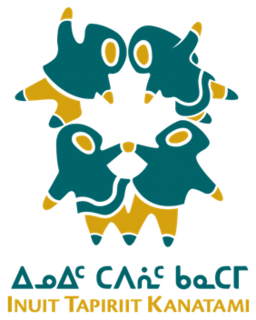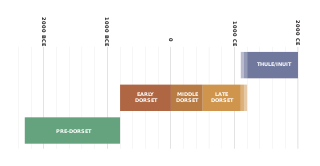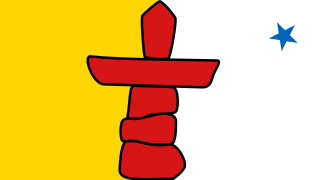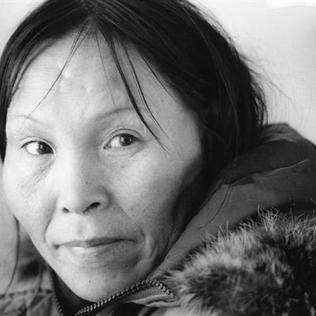Related Research Articles

Pond Inlet is a small, predominantly Inuit community in the Qikiqtaaluk Region of Nunavut, Canada, located on northern Baffin Island. To the Inuit the name of the place "is and always has been Mittimatalik." The Scottish explorer Sir John Ross had named an arm of the sea that separates Bylot Island from Baffin Island as Pond's Bay, and the hamlet now shares that name. On 29 August 1921, the Hudson's Bay Company opened its trading post near the Inuit camp and named it Pond Inlet, marking the expansion of its trading empire into the High Arctic.

Inuit Tapiriit Kanatami, previously known as the Inuit Tapirisat of Canada, is a nonprofit organization in Canada that represents over 65,000 Inuit across Inuit Nunangat and the rest of Canada. Their mission is to "serve as a national voice protecting and advancing the rights and interests of Inuit in Canada."

Kinngait, formerly known as Cape Dorset until 27 February 2020, is an Inuit hamlet located on Dorset Island near Foxe Peninsula at the southern tip of Baffin Island in the Qikiqtaaluk Region of Nunavut, Canada.
Tagak Curley is an Inuit leader, politician and businessman from Nunavut. As a prominent figure in the negotiations that led to the creation of Nunavut, Tagak is considered a living father of confederation in Canada. He was born in a hunting camp at Coral Harbour, Northwest Territories.
Jose Kusugak was an Inuk politician from Repulse Bay, Northwest Territories, Canada. He moved, along with his family, to Rankin Inlet in 1960.

The history of Nunavut covers the period from the arrival of the Paleo-Eskimo thousands of years ago to present day. Prior to the colonization of the continent by Europeans, the lands encompassing present-day Nunavut were inhabited by several historical cultural groups, including the Pre-Dorset, the Dorsets, the Thule and their descendants, the Inuit.

Nunavut is the largest and northernmost territory of Canada. It was separated officially from the Northwest Territories on April 1, 1999, via the Nunavut Act and the Nunavut Land Claims Agreement Act, which provided this territory to the Inuit for independent government. The boundaries had been drawn in 1993. The creation of Nunavut resulted in the first major change to Canada's political map in half a century since the province of Newfoundland was admitted in 1949.

Inuit are a group of culturally similar indigenous peoples inhabiting the Arctic and subarctic regions of Greenland, Labrador, Quebec, Nunavut, the Northwest Territories, and Alaska. Inuit languages are part of the Eskimo–Aleut languages, also known as Inuit-Yupik-Unangan, and also as Eskaleut. Inuit Sign Language is a critically endangered language isolate used in Nunavut.

The Inuvialuit Settlement Region, abbreviated as ISR, located in Canada's western Arctic, was designated in 1984 in the Inuvialuit Final Agreement by the Government of Canada for the Inuvialuit people. It spans 90,650 km2 (35,000 sq mi) of land, mostly above the tree line, and includes several subregions: the Beaufort Sea, the Mackenzie River delta, the northern portion of Yukon, and the northwest portion of the Northwest Territories. The ISR includes both Crown Lands and Inuvialuit Private Lands.
The Cape Hope Islands are an uninhabited Canadian arctic islands group located within the midsection of James Bay in Nunavut, Canada. They are situated south of Vieux-Comptoir.
Over the course of centuries, many Indigenous Canadians have played a critical role in shaping the history of Canada. From art and music, to law and government, to sports and war; Indigenous customs and culture have had a strong influences on defining Canadian culture. The Indspire Awards are the annual awards presented by Indspire, formerly the National Aboriginal Achievement Foundation. The awards were first established in 1993 in conjunction with the United Nations declaring the 1990s "International Decade of the World's Indigenous peoples". June 21 is Canada's National Aboriginal Day, in recognition of the cultural contributions made by Canada's indigenous population. The day was first celebrated in 1996 following Governor General of Canada Roméo LeBlanc's proclamation.

Inuit Nunangat is the homeland of the Inuit in Canada. This Arctic homeland consists of four northern Canadian regions called the Inuvialuit Settlement Region, the territory Nunavut (ᓄᓇᕗᑦ), Nunavik (ᓄᓇᕕᒃ) in northern Québec, and Nunatsiavut of Newfoundland and Labrador.

Natan Obed is a Canadian politician who has served as president of the Inuit Tapiriit Kanatami (ITK) since September 2015.

Napachie Pootoogook was a Canadian Inuit graphic artist.

Ovilu (Oviloo) Tunnillie was born at Kangia, Baffin Island, Northwest Territories and was an Inuit sculptor. Her carvings served as her commentary on both traditional and changing contemporary Inuit culture. She was one of the first Inuit artists to work with an autobiographical theme.

Ulayu Pingwartok was a Canadian Inuk artist known for drawings of domestic scenes and nature.
Aluki Kotierk is an Inuk politician. She was born in Iqaluit, Nunavut, but grew up in Igloolik.
Oopik Pitsuilak is an Inuk carver and sculptor who works in the Cape Dorset community of Inuit artists in Canada.
Ruben Komangapik is an Inuit artist primarily known for his mixed media sculptures. He is also a musician, performing both traditional Inuit drumming and singing as well as playing bass guitar in the heavy metal band Slayvz. He was born in Iqaluit, and his home community is Pond Inlet (Mittimatalik) on the high north-east coast of Baffin Island (Qikiqtaaluk).
References
- ↑ "Freeman, Minnie Aodla | Inuit Literatures ᐃᓄᐃᑦ ᐊᓪᓚᒍᓯᖏᑦ Littératures inuites". inuit.uqam.ca. Retrieved 3 June 2021.
- ↑ "Fort George Roman Catholic (Residence Couture)". 2022. Retrieved 25 August 2022.
- ↑ "June 4, 1906: Sanatorium opens on Hamilton's west Mountain". 23 September 2016. Retrieved 25 August 2022.
- ↑ "Telling the story of hundreds of Inuit, sick with TB, who were shipped to Hamilton". 9 November 2016. Retrieved 25 August 2022.
- ↑ "Culture shock: Mini Aodla Freeman recalls moving from James Bay to Ottawa in the 1950s". 26 November 2015. Retrieved 25 August 2022.
- ↑ "Inuit land use and occupancy project : report / prepared by Milton Freeman Research Limited under contract with the Department of Indian and Northern Affairs". publications.gc.ca. Public Services and Procurement Canada. 1 July 2002. Retrieved 12 August 2022.
- 1 2 3 "Mini Freeman | The People and the Text". thepeopleandthetext.ca. Retrieved 12 August 2022.
- ↑ "Inuit Tapiriit Kanatami (ITK) | The Canadian Encyclopedia". thecanadianencyclopedia.ca. 21 November 2019. Retrieved 12 August 2022.
- ↑ "Inuit | The Canadian Encyclopedia". thecanadianencyclopedia.ca. 24 September 2020. Retrieved 12 August 2022.
- ↑ Minnie Aodla Freeman. Ikumaaliminik -- living in two hells, in: M. Zaslow (ed) A Century of Canada's Arctic Islands, 1880-1980, pp. 267-274. Royal Society of Canada, Ottawa, ON. 1981.
- ↑ Minnie Aodla Freeman. Survival in the South, in R. Gedalof (ed) Paper Stays Put: A Collection of Inuit Writing, pp. 101-112. Hurtig Publishers, Edmonton, AB. 1980.
- ↑ Leroux, Odette; Jackson, Marion E.; Freeman, Minnie A., eds. (1994). Inuit Women Artists: Voices from Cape Dorset. Douglas & McIntyre. ISBN 1-55054-131-5.
- ↑ Leven in het noordpoolgebie [Living in the Arctic], M. Aodla Freeman, W.E. Taylor, Jr., F. Bruemmer. Schuyt, Haarlem, Netherlands.1985.
- ↑ Epilogue: Living in two worlds. In M.M. Jacobs and R. B. Richardson III (eds), Arctic Life: Challenge to Survive. pp 195-201. Carnegie Museum of Natural History. Pittsburgh, PA. 1983.
- ↑ "Life Among the Qallunaat" . Retrieved 25 August 2022.
- ↑ "Life Among the Qallunaat | University of Manitoba Press". uofmpress.ca. Retrieved 20 June 2016.
- ↑ Freeman, Mini (13 August 2015). ""One day, somebody is going to forget": A Conversation With Mini Aodla Freeman" (Interview). Interviewed by Martin, Keavy; Dunning, Norma; Rak, Julie. University of Manitoba Press. pp. xvi–xvii, 273–275. Retrieved 25 August 2022.
- ↑ "2015: Our Books of the Year". 49th Shelf. 23 November 2015. Retrieved 25 August 2022.
- ↑ "Julie Rak, PhD (McMaster) MA (Carleton) BA Hons. (McMaster)". University of Alberta . Retrieved 25 August 2022.
- ↑ People of the Islands. Directed by Hugh Brody. Channel 4: London. 1982.
- ↑ Nunaaluk: A Forgotten Story. Directed by Louise Abbott. COTA. 2014.
- ↑ "Nunaaluk - A Forgotten Story".